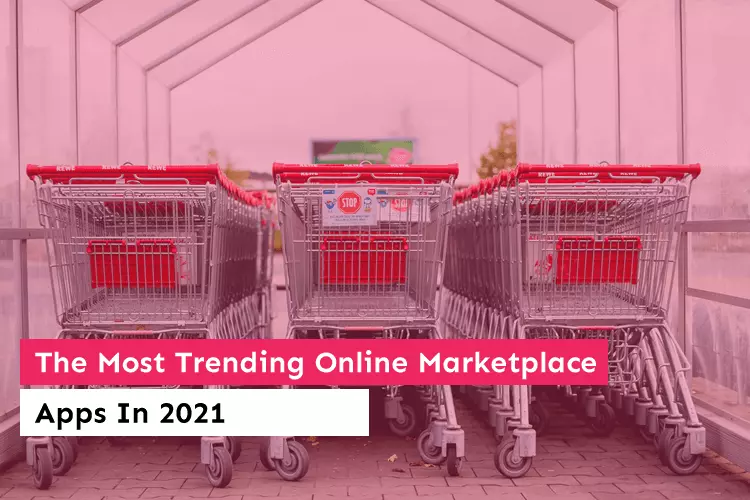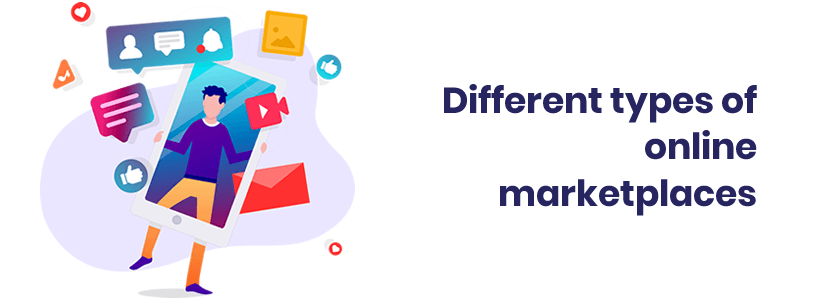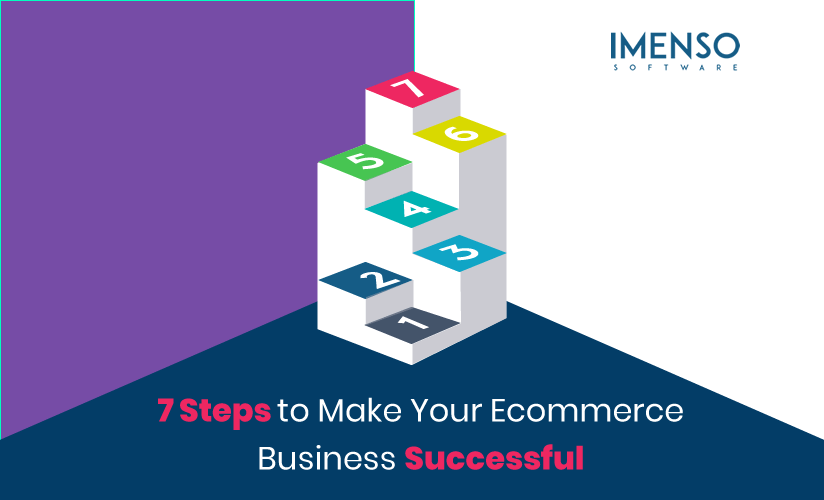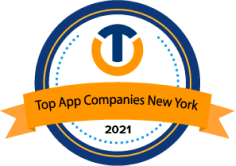The Most Trending Online Marketplace Apps In 2021

If a middle-aged working couple has to buy new house decor, where would they go? Or if a teenager is looking to buy vintage boots to amp up their style game, what should they do?
The answer to both of these questions and millions of others like them are online marketplace apps like amazon, Etsy, eBay, Flipkart, and others.
In the last 4 – 5 years, we have seen so many marketplace apps pop up in the market and not just to sell fashion or groceries; there is a dedicated marketplace app for every industry now.
This blog post will talk about marketplaces, what they are, the different types of marketplace apps, and which are the ones trending most to help you kickstart your own marketplace business.
What is an online marketplace?
An online marketplace is a platform with two parties – buyers and sellers. Sellers bring the inventory to the marketplace, buyers bring the demand, and the transactions are in the middle. For Amazon, the transactions are for the products; for Airbnb, it’s the houses on rent or spaces being traded; for capsule, the transaction for buying medicines.
The difference between an ecommerce website and a marketplace is that on ecommerce, products or services from one brand are being sold. On the contrary, marketplaces can have thousands or millions of sellers offering a variety of products. Such huge inventory brings more traffic to the marketplaces and gets more exposure to the sellers on it.
Marketplace companies are some of the richest businesses in the world. As of June 2021, Amazon is worth $314 billion. Other big marketplaces like Alibaba, eBay, uber all are listed in the super-wealthy enterprises.
The real question here is why marketplaces are so valuable?
And the answer is market liquidity. The most accurate definition of market liquidity is the reasonable expectation of selling something you have listed on the marketplace or finding what you are looking for. This way, both the parties – sellers and buyers get something out of the marketplace.
Marketplaces also have a cross-side network effect. The more buyers join the marketplace; the more sellers can sell their products or services. And the more sellers join the marketplace, the more inventory there is for buyers to choose from. Thus, this virtual cycle keeps running as the marketplace matures. This cross-side network effect has many benefits:
- The cost of customer acquisition goes down
- Revenue per customer goes up
- Locking in the retention of users
Also Read: Quick Insights: What You Need To Know To Build A Successful Marketplace App In 2021
Different types of online marketplaces

There are marketplace apps for different niches online, and although the concept is the same, there are subtle differences. Knowing which type of marketplace is important because it decides the shopping experience, the customer persona who will buy the product/service, the type of product/service listing and other demands a marketplace should fulfil.
1. Physical product marketplaces
The marketplaces which sell physical products only are physical product marketplaces. The best example is Amazon. All the other apps that sell shoes, makeup products, or any other physical products fall in this category.
If you are interested in developing a marketplace with physical products, keep one thing in mind. There are thousands of sellers on your app, and customers order different items from different sellers. When they receive shipping packages, wrap them with your logo on them to know what to expect. And it’s also a great brand establishing move.
2. Digital product marketplaces
In this type of marketplace, digital products are sold. No need for delivery; customers can simply download what they ordered on their computers or smartphones. Amazon Kindle is an example of a digital product. When users pay for an ebook, it is instantly added to their kindle account to read it anytime. One seller sells the products here.
3. Properties and spaces marketplaces
One of the most popular startups in this type of marketplace is Airbnb. You might have got what we are talking about. And you are right. This type of marketplace sell or rent properties, spaces, events, houses or apartments. Some other examples of this marketplace are Eventbrite and studio time.
4. Services marketplace
There are marketplaces for services as well. Through these marketplaces, customers can hire or rent experts for their specialties. The services can be digital or in person. Freelance marketplaces like Upwork, Fiverr, freelancer are the platforms where users can hire experts for digital services like web designing, marketing, content writing and others.
The other marketplaces of this type provide access to in-person professionals for regular day services like cleaning, painting, home salon, etc.
The services marketplaces also run on the same principle as others. There are two parties, one with the demand and the other one fulfilling the demand.
The most trending marketplaces in 2021
Do you know that global ecommerce sales are set to exceed $4.5 trillion in 2021? And with this question, you also get the hint of what’s trending most. Yes, it’s ecommerce.
The top ecom giant is amazon, with 5.2 billion visits/month, followed by eBay with 1.7 billion visits/month. Other ecommerce marketplaces also have a high number of visitors with a good retention rate, including Flipkart, Walmart, and Etsy.
Other ecommerce marketplaces sell physical goods but not globally. Every country has its ecom platform. For instance, Trendyol is a marketplace for Turkey. It clocks 206.2 million visitors/month.
Judging by the figures, it is fair to conclude that the e-commerce sector is exploding, and it is one of the most promising sectors for launching a marketplace app.
But the marketplace business model doesn’t just apply to ecommerce. It is a viable option for many sectors and services. If there can be a marketplace for renting a stranger’s house in a completely different county or hiring someone to code your new business website 8,000 miles away. In that case, there can be a marketplace for buying or renting any product or services you can imagine.
Here is a list of the different categories of marketplaces in the world. Take a look:
- Online medicine purchase and delivery
- Homewares
- Books
- Collectibles & antiques
- Electronics
- Baby products, apparel & fashion
- Sports
- Toys
- Arts, crafts and gifts
- Musical instruments

Ready to build your marketplace app?
Developing a marketplace is quite the challenge. Probably the toughest one you would overcome in your entrepreneurial career. Getting the sellers and buyers to join the platform is a hard nut to crack. And on top of that, dealing with the competition in the industry.
You need to keep one thing in mind – the principal focus is to get everyone, the customers, the sellers and the inventory on board. It’s vital for the platform’s success. Whoever manages this first wins in the marketplace app game.
If you would like to discuss your idea with a team of marketplace expert developers, reach out to us. We are an established ecommerce marketplace development company with hands-on experience in building multiple marketplaces for our clients.
Similar Posts

MEAN vs MERN: Which Stack is Right for Your Next Project?
Embarking on a new web development project? Choosing the right technology stack can make all the difference in your project’s success. In the realm of web development, two popular stacks have emerged as powerful contenders: MEAN Stack Development and MERN Stack Development. But which one is the perfect fit for your next venture? In this […]...

Why MERN Stack is the Best Choice for Your Next Web Development Project
In today’s rapidly evolving digital landscape, choosing the right technology stack for your web development project is crucial. A well-rounded stack should offer efficiency, flexibility, scalability, and a supportive community. Among the various options available, the MERN stack stands out as a powerful and popular choice. Comprising MongoDB, Express.js, React.js, and Node.js, the MERN stack […]...

7 Steps to Make Your Ecommerce Business Successful
You must have heard about those eCommerce stores doing millions of dollars in revenue. But that’s not the reality for many. There are about 12 million eCommerce websites online and less than a million make under $1000 per year. ...






